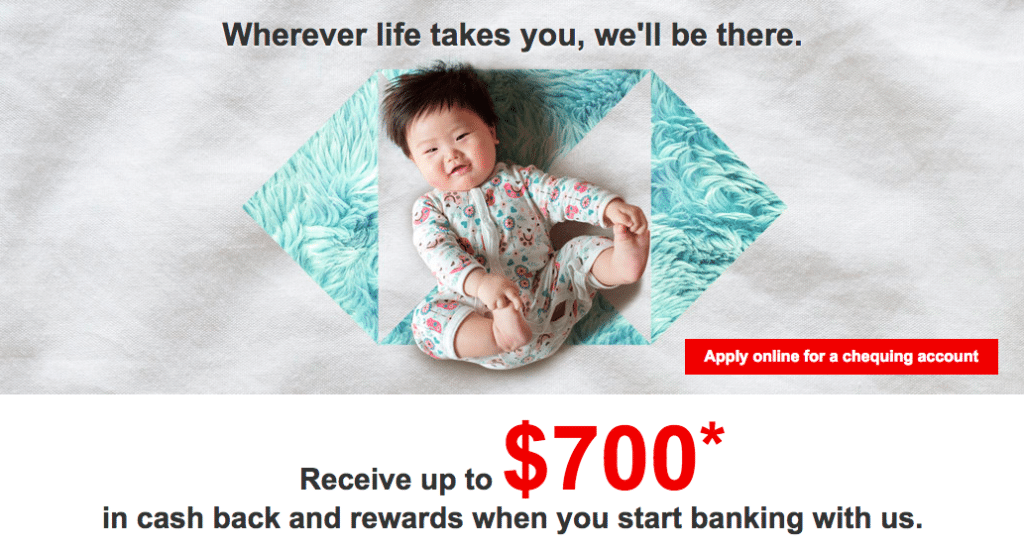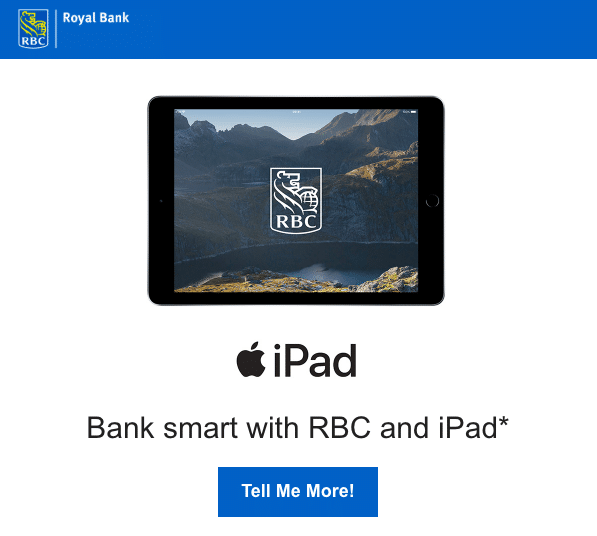Canada’s big banks are trying to lure new customers to switch banks this summer by offering juicy incentives such as free iPads or hundreds of dollars in cash back. Don’t take the bait.
To get the sweet bonus you’ll have to sign up for an expensive monthly plan, and/or apply for other products such as a savings account or credit card. That’s not all. To prove your loyalty you’ll also have to complete a direct deposit (i.e. payroll) or arrange two or more pre-authorized bill payments within a certain period of time.
What it takes to switch banks
Banking is arguably the most sticky relationship we have as consumers. We stay with the same bank for years, decades, and in some cases throughout our entire lives. For many of us, getting a root canal sounds more appealing than switching banks.
Banks know they have to pull out all the stops to try and win your business. That’s why you’re seeing some of the richest ‘welcome offers’ ever advertised. They do look attractive at first blush.
RBC wants to give you the latest 9.7″ iPad at no cost. BMO can offer up to $350 cash, while CIBC and TD Bank each have $300 with your name on it. While I didn’t find a current promotion for Scotiabank, I did find a doozie from HSBC, which is offering up to $700 in cash back and rewards for making the switch.

What’s the catch? There’s always a catch. Let’s take a peek inside the terms and conditions to see what those asterisks are all about.
How to get $700 cash back from HSBC
All you need to do to earn this bonus is open up an HSBC chequing account, make a minimum deposit, and register for HSBC online banking. No big deal, right? (Checks fine print). Not quite so simple.
You’ll get $500 when you open HSBC’s Premier account and make a $25,000 deposit within one month. Wait, what?!? There’s more. To be eligible for the Premier account you’ll need a minimum $100,000 in combined deposits and investments, or a mortgage balance of $500,000 or greater. If you can’t meet one of those requirements you’ll be charged a $34.95 monthly fee within six months of opening the account.
You can also receive $100 cash back when you set up a recurring payroll deposit within three months of opening your account. Then you can get up to $100 in rewards value when you apply for and receive the HSBC Premier World Elite MasterCard. The card comes with a $99 annual fee for HSBC Premier clients.
Let’s get real on this deal. If you’re the type of person who has $25,000 lying around are you really going to be interested in chasing $700 bank promos? Even if you manage to meet all the requirements and “earn” the $700 bonus it’ll take less than two years before fees completely erase that cash back.
How to get a free iPad from RBC

Almost as incredulous as the HSBC promotion, here’s RBC offering an iPad (doesn’t everyone already have one of these?) at no cost for new customers who sign up for an All-Inclusive bank account. A quick Google search revealed this 9.7″ iPad retails for $429.
To get it you’ll need to open an RBC Signature No Limit Banking account ($14.95 per month) or RBC VIP Banking account ($30 per month), then set up your payroll as a direct deposit or add two pre-authorized payments.
At $30/month you’ll have paid back RBC for the iPad within 14 months.
By the way, if your devious mind is thinking about closing your account right after receiving your free iPad, think again. Get a load of this fine print:
If you received the Reward and then downgraded, changed or closed your Eligible Personal Banking Account or undid any of the Qualifying Criteria you performed to get the Reward, such as cancelled any payroll/pension deposit or pre-authorized payment, at any time before September 27 2019, we reserve the right to debit your Eligible Personal Banking Account or any of your accounts with us for the value of the Reward you selected as described in the table below, plus applicable taxes, even if this places you into overdraft. If your Eligible Personal Banking Account is closed and you do not have any other account with us at that time, we will send you an invoice for the value of the Reward you selected, plus applicable taxes, which you agree to pay in 30 days.
Ruthless.
How to get $350 cash back from BMO

BMO wins for the most complicated offer. Start with a chequing account. Choose either the Performance ($15.95/month), Air Miles ($15.95/month), or Premium plan ($30/month) for a $200 bonus, or choose the Plus plan ($10.95/month) for a $100 bonus.
To get your chequing account bonus:
- Open a chequing account with one of the above plans and make a deposit of ANY amount.
- Set up a direct deposit for three consecutive months with the first deposit posted to the account by November 30, 2018.
Add to your bonus by adding an eligible savings account, credit card or investment account. Each one earns you an extra $50 (for a total of up to $150). Fine print check: the balance of your savings account and/or investment account must be at least $5,000 as of November 30, 2018.
Once you’ve opened your accounts and met all the terms and conditions, you’ll receive your cash bonus by February 28, 2019.
Assuming you manage to earn the entire $350 worth of incentives it’ll take just under two years to give all that back to BMO in monthly account fees – and less than one year if you chose the $30/month Premium plan.
How to get $300 cash back from TD Bank

New TD chequing account customers can get $300 cash back by opening an Unlimited Chequing Account or All-Inclusive Banking Plan and then completing two of the following transactions with their new account:
- Set up a recurring Direct Deposit
- Make an online bill payment (minimum $50)
- Set up a recurring Pre-Authorized Debit (minimum $50)
Pretty straightforward. Let’s check the fees and fine print.
The Unlimited Chequing Account comes with a monthly fee of $15.95, while the All-Inclusive Banking Plan comes in at $29.95 per month.
The $300 will be deposited to the new account within eight weeks after all conditions have been met. (Looks like TD is not as strict about closing or downgrading your account after receiving the bonus).
Choose the Unlimited account and you’ll pay back your bonus to TD within 18 months. Take the All-Inclusive option and you’re back to even after just 10 months.
How to get $300 cash back from CIBC

New CIBC chequing account customers can earn $300 cash back by opening a CIBC Smart account. It’s the most straightforward and potentially useful offer to switch banks, but still requires a closer look under the hood.
The first step is to open the Smart Account and also provide your email address (for some reason). Next, complete a direct deposit or two pre-authorized payments within three months. Seems reasonable.
Pay as little as $4.95 per month if you stick to 12 transactions or fewer per month. Once you’ve made 20 transactions the monthly fee is capped at $14.95.
The cash reward will be deposited into your Smart Account within 12-16 weeks of completing the required transactions. At worst you’ll pay back CIBC in 20 months, but if you only paid the minimum $4.95/month it would take 5 years for CIBC to recoup its bonus from you.
Final thoughts
Acquiring monthly recurring revenue is the Holy Grail for any business. Banks feed off of it. That’s why they’re able to offer seemingly rich incentives like the ones highlighted here – because they know that a one-time $300 outlay will be paid back easily within two years, if not sooner, plus the potential for a longer term relationship and cross-selling other products.
It’s smart business for the banks, not so much for you and me.
While I’ll admit I’m the first to jump on a new credit card offer (as long as it meets my four rules for credit card churning), I’m reluctant to switch banks for what amounts to be a few hundred bucks and ultimately a huge hassle.
Save yourself some aggravation and don’t fall for the shiny toy in the window. If anything, use these advertisements as leverage with your own bank – negotiate a fee or a better interest rate for yourself. After all, wouldn’t it be nice to get something for your loyalty?
Holiday’s over. Back to the grind. We spent an amazing 10 days exploring the wilderness on Vancouver Island. It was a much needed break, both for the family and for me personally to recharge my batteries and get the creative juices flowing again. I’m coming back full of ideas to share on this blog and to put into action on some of my other projects.
I read a couple of books on vacation including The Four Hour Work Week by Tim Ferris. The book is 10 years old now and some of the content is dated, but the concept of untethering yourself from your 9-to-5 life to follow your passions still holds true.
I’ll admit there’s something I find cringeworthy about Ferris’ schtick but nevertheless the parts that spoke to me pushed the right buttons and got me thinking of ways to accelerate my financial freedom goals. The trouble is that my main sources of income all require my active involvement (writing, consulting, planning) rather than providing passive income streams. It’s not scalable.
That said, I have some ideas around creating a course that solves some financial planning basics such as budgeting and cash flow, debt management, investing for beginners, and a pre-retirement checklist, all templated with spreadsheets and tutorials so that my ongoing involvement is minimal. Stay tuned for more on this project in the near future.
As for our holiday, one of the goals for this trip was to get our kids accustomed to travel. I’m so proud of how our kids handled the flights, car rides, and long hikes through the wilderness. I’m 100% confident that they’ll be perfect travellers on our next big trip to Ireland and Scotland in 2019. I just hope they didn’t get too spoiled by their little taste of luxury travel.

Plaza Premium Lounge (YVR)
Promo of the Week:
I’ve been using the American Express Cobalt Card for almost a year now and while this card entered the market with a big splash I’m not sure it’s getting deserved consideration as one of the best rewards credit cards on the market.
First of all, you get 5 times points on eats and drinks. That means big earnings on groceries, dining, and at the liquor store. You also get 2 times points on travel and transit, and 1 point everywhere else.
I use it predominantly at grocery stores that accept Amex – so at Save On Foods and Safeway – plus anytime we eat out, and of course when I pick up wine at the liquor store. 5% adds up in a hurry and I like that I can use Points for Purchase to simply erase any travel purchase made on the card (1000 points = $10).
Finally, new sign-ups can earn up to 30,000 Membership Rewards points in a year when you spend a minimum of $500 per month (2,500 bonus points per month). Use my referral link to sign up and I’ll earn 5,000 Membership Rewards points too!
This Week’s Recap:
On Monday I wrote about boosting retirement savings during your final five working years.
On Thursday I explained how new spending patterns in retirement might impact your plans.
Our Facebook following is growing! Make sure to follow along and join nearly 7,000 Boomer & Echo fans. We’re also on Twitter and Instagram.
Weekend Reading:
The Bank of Canada hiked its key interest rate again by 25 basis points – the fourth such increase since last summer. Time for HELOC borrowers to reign-in and pay down their balances.
Speaking of which, here’s Rob Carrick with a rising rates guide to mortgages, HELOCs, GICs, savings, and more.
Downtown Josh Brown explains the nine essential conditions to commit massive fraud.
Nick Maggiulli shares a brilliant look at how event order and intensity shapes our memories:
“The question is: what beginning, end, and peak market experiences do YOU have and how might they bias your investment decisions in the future?“
In the latest edition of the Canadian Couch Potato podcast Dan Bortolotti interviews the Globe and Mail’s Rob Carrick, who has been covering personal finance and investing for 20 years.
PWL Capital’s Justin Bender has put together several sample ETF portfolios for various accounts, along with a step-by-step guide to get started.
CFP Jason Heath explains the right way to unwind your locked-in retirement account.
Is Kylie Jenner a self-made woman? Regardless of what you think, the fact is this 20-year-old built a $900M fortune in less than three years.
Why Australians can’t get enough of Scott Pape, the Barefoot Investor.
Ellen Roseman says, don’t underestimate how long it can take to apply for or renew a Canadian passport.
Finally, I chose experiences over stuff when I decided to book a whale watching tour for the family last week. But it wasn’t just the $500 price-tag that didn’t sit well with me. Click and scroll this Twitter thread for the gory details:
Taking the family on a whale watching tour today because experiences over stuff, right guys? But damn, experiences, why are you so expensive?!? pic.twitter.com/7ceYFaj59U
— Boomer and Echo (@BoomerandEcho) July 12, 2018
Enjoy what’s left of the weekend, everyone!
I’m typing this edition of weekend reading on the deck of our summer vacation rental in Port Renfrew, taking in this breathtaking view of Port San Juan. Yesterday we watched two bald eagles dive from the tree tops towards the water to dine on fish, spotted a family of hummingbirds sipping nectar from nearby flowers, and took a stroll through the rich tide pools at Botanical Beach Provincial Park.
The weather has been amazing so far – even the bit of rain we had yesterday was more like a mist and we managed to stay warm on our hike. We’re contemplating a whale watching tour later in the week; a pricey but potentially once in a lifetime experience for the family while we’re out on Vancouver Island.
Off to explore more of this spectacular region!

This Week’s Recap:
On Tuesday I cautioned readers to avoid these pitfalls when financing a vehicle.
On Friday I wrote about making rational financial decisions vs. behavioural driven decisions.
Over on Rewards Cards Canada I looked at Brim Financial’s failure to launch with its ‘revolutionary’ MasterCard.
Promo of the Week:
New Tangerine clients can earn 2.75 percent interest for six months when they open a new savings account. Sign up by the end of July and you’ll also get a $50 cash bonus when you use a friend’s Orange Key code (with a minimum $100 deposit).
Use my code – 39602788S1 – and I’ll get a small bonus too! Sign up here.
Weekend Reading:
We’ll start with Nick Maggiulli, Of Dollars and Data, who argues that knowledge is both a privilege and a curse when it comes to investing.
Rob Carrick nails it when he says the missing link in financial literacy is the financial-services industry’s inability to communicate in plain language:
“To paraphrase a comment reportedly made by Albert Einstein, mastery of a subject means you can explain it simply.”
I couldn’t agree more:
No doubt this is why I started reading (and now writing) a personal finance and investing blog, and why people prefer to get their information from forums such as Reddit and Red Flag Deals, etc. #ELI5 https://t.co/KJ6SergHHm
— Boomer and Echo (@BoomerandEcho) July 6, 2018
Here’s financial planner and Sketch Guy Carl Richards explaining why the best investing approach should feel like lethargy bordering on sloth.
How you draw down your retirement savings could save you thousands — and this program proves it.
Millionaire Teacher Andrew Hallam lists three massive risks of actively managed mutual funds.
As at the end of 2017, Canadians still had 88.8% of their mutual fund and ETF assets invested in actively managed products. Ben Felix explains why their performance continues to be dismal:
Here’s Melissa Leong on how to host a summer bash without breaking the bank. I like the tip to splurge on food, if nothing else.
Preet Banerjee says if coffee is a passion, you should try roasting your own beans at home (and maybe save thousands of dollars).
Spending more than $1,000 on children’s activities? Ask your child to narrow their interests down to 2-3 and plan for the costs in advance.
My Own Advisor Mark Seed talks about diversifying his TFSA with ETFs.
Why some homeowners will pay more than expected to renew their mortgage.
Rob Carrick discusses how to say no to friends and family who want to involve you in things you can’t afford, with Shannon Lee Simmons, author of Worry-Free Money.
Finally, here’s an ex-Wall Street short seller’s drastic advice for saving Vancouver’s economy — and itself.
Have a great weekend, everyone!
